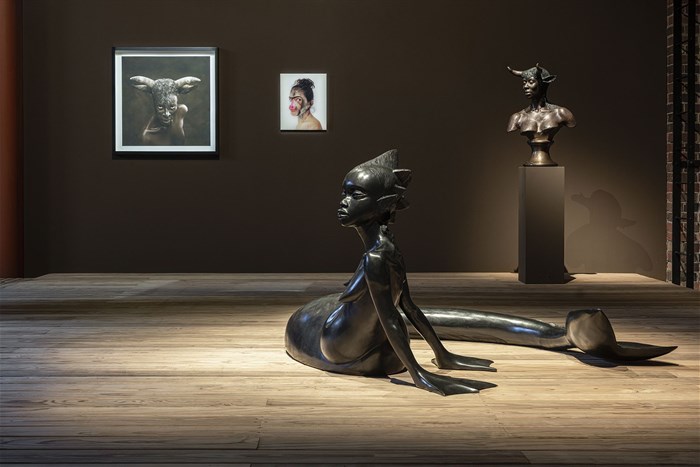Joburg Contemporary Art Foundation to open with Contemporary Female Identities in the Global South exhibition
Contemporary Female Identities in the Global South explores multiple constructions of female identities by five artists, Bharti Kher (India), Nandipha Mntambo (South Africa), Wangechi Mutu (Kenya/USA), Shirin Neshat (Iran/USA) and Berni Searle (South Africa), whose practices are embedded in the Global South. This exhibition proposes a realm in which these subjects explore worlds of their choosing, in which they might be mother, martyr, warrior or hybrid.

The exhibition is divided into three areas or worlds. The first is configured around the Fall, a realm where the natural and human worlds meet. The animal-human hybrid figures represent the second world of the exhibition. Hybridity refers to the mingling of species, races or cultures, a crossing of one thing with another. These figures are both abject and beautiful. This uncomfortable ambivalence is meant to provoke a response in the viewer, who must consider the relationship between themselves and other, different subjectivities. In the third world of the exhibition, the viewer is reminded that the body is real and embedded in race, religion and identity.
The significance of an exhibition of black women artists in the context of current world events is more relevant than ever,” says Clive Kellner, the executive director of JCAF and curator of the exhibition. “As issues of race and gender have become so politicised and polarised, hybridity may represent a productive line of enquiry for understanding our national, communal and individual identity formations.The exhibition design presents three other-worldly or dream-like spaces, connected by metaphorical ‘bridges’ that nonetheless draw attention to the constructed-ness of the exhibition environment.
Lorraine O’Grady expresses this conceptual framework of identity bridges: “Because I was raised by West Indian parents in one of the most traditional areas of New England culture, Boston’s Back Bay, my childhood placed me at a distance from wherever I stood and required me to always build a bridge to some other place. One had to be several things at once …both Caribbean and New England, both African American and West Indian, both Black and white …and to daily negotiate the differences,“
Visit www.jcaf.org.za to view a virtual tour of the exhibition and for further information.